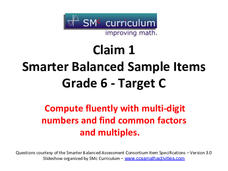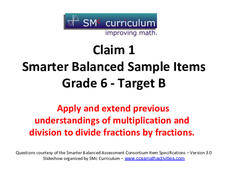CCSS Math Activities
Smarter Balanced Sample Items: 6th Grade Math – Target C
Are you looking for review questions before standardized testing? Grade 6 Claim 1 Item Slide Show offers nine questions covering a variety of topics using decimals, factors, and multiples. With separate slides for answers, using the...
CCSS Math Activities
Smarter Balanced Sample Items: 6th Grade Math – Target B
Are you tired of hearing "When am I ever going to need to use this in real life?" Cooking word problems, in addition to other math work, answer the question easily. Grade 6 Claim 1 Item Slide Shows offers eight problems reinforcing...
CCSS Math Activities
Smarter Balanced Sample Items: 6th Grade Math – Target A
Only in math problems do people buy 18 cans of tennis balls and no one wonders why. Scholars solve for the number of total tennis balls given the ratio of balls per can. This and other ratio word problems in a PowerPoint from Grade 6...
CCSS Math Activities
Smarter Balanced Sample Items: 6th Grade Math – Claim 4
Develop a model for prep. The resource provides examples of how items reflect modeling and data analysis for Smarter Balanced assessments. Items use on-grade or below-grade content to focus on the modeling aspect. The questions revolve...
CCSS Math Activities
Smarter Balanced Sample Items: 6th Grade Math – Claim 3
Communication is key. Eight sample items show how important communication and reasoning is for sixth grade mathematics. Part of the Claim 2-4 slide show series, the presentation uses concepts from fifth and sixth grade to illicit...
CCSS Math Activities
Smarter Balanced Sample Items: 6th Grade Math – Claim 2
They claim there are problems on the assessment. The presentation provides 13 questions that demonstrate the problem-solving claim for Smarter Balanced assessments. Teachers use the resource to provide examples of problem-solving...
Didax
Pi Day #1a – Discovering Pi
Unravel the mystery behind the infamous number pi. Scholars complete a series of activities that explores where pi comes from, its digits and estimation strategies. Pupils should be ready to measure, calculate, and look for patterns to...
Mathed Up!
Collecting Like Terms
Gather all similar terms together. Initially created to aid in the review of the General Certificate of Secondary Education, the resource provides opportunities to practice collecting like terms in algebraic expressions and multiplying...
Mathed Up!
HCF, LCM, and Product of Primes
Give the class a prime example of using prime numbers. After reviewing prime factorization of numbers with the video, pupils use their knowledge to determine greatest common factors and least common multiples in the worksheet. The...
Scholastic
Lesson 3: Essay Organizer
A three-minute exercise warms-up scholars' writing abilities in order to follow a writing process that ends in an essay. The essay's topic is a barrier and the values used to break it. Four steps include choosing a topic, jotting-down a...
Mathed Up!
Sequences
Explicitly talk to the class about sequences. A segment of a review series for the General Certificate of Secondary Education math assessment provides a review of arithmetic sequences. Pupils watch a video showing how to find terms given...
Mathed Up!
Solving Equations
Use the same procedures, just with rational numbers. The resource builds upon scholars' ability to solve linear equations that involve rational numbers. Pupils solve one-step, two-step and multi-step equations in the review for the...
Mathed Up!
Utility Bills
What is the total cost? Provided with seven problems, pupils determine the total cost for utilities. Scholars determine the amount of the utility used and determine the cost based upon the given unit rate. The resource is part of a prep...
Corbett Maths
Quantitative and Qualitative Data
Classify the Big Ben of all data with a video that defines quantitative and qualitative data. Given data about Big Ben, the presenter classifies each piece based upon the definitions. In the Types of Data worksheet, individuals show they...
Corbett Maths
Discrete and Continuous Data
Let's be discrete about the types of data. A short video provides the definitions of discrete and continuous data. After providing the definitions, the resource takes different types of data and sorts them based on type and provides an...
PBS
Atlantean Dodgeball
Which team has the advantage? An imaginary story about a game of dodgeball in the lost city of Atlantis demonstrates the ways to compare two quantities. One coach compares the ratios of the numbers of players on each team while the other...
Google
Code for Equality
It's my belief that all learners should have equal access to computer science projects! Young computer scientists learn about variables, encapsulation, sequences, and objects in block-based coding. They create a collage by first...
PBS
KidVid: Fractions and Scale
Scale the challenge of learning about ratios and scales. Young mathematicians learn to incorporate fractional measurements when considering scales and scale factors. They use an interactive to investigate the concept and critically...
PBS
KidVid: Equivalent Ratios
There's no equivalent to this interactive. To learn about equivalent ratios, scholars first watch a video of a pupil trying to find an equivalent ratio. They consider whether the pupil is correct and explain their reasoning. Then, they...
PBS
Super Bear: Comparing Mass
A super bear is a whole lot of gummy bear. Scholars hone their estimation skills by completing an activity. Given the masses of a mini gummy bear and a regular gummy bear, they must determine the number of each needed to have the same...
PBS
The Lowdown — Poverty Trends: What Does It Mean to Be Poor in America?
Here's a resource that's rich with learning opportunities. Future mathematicians investigate the poverty rate in America over time. They use an interactive to compare the poverty rate during the Great Recession of 2008 to other years,...
PBS
Soul Food Junkies: Portions
Serve up a rate of percents. The Math at the Core resource investigates the percent of daily value of sodium and saturated fats in different foods. Pupils determine the number of serving sizes they eat of popular snack foods and...
PBS
Math with Jake: Ratios and Fractions
And the beat goes on. The installment of the Math at the Core: Ratios series introduces time signatures in music. A musician shows the relationship between different types of musical beats. Working in pairs, classmates create beat...
PBS
Math with Jake: Frequencies and Pitch
Be an octave above the rest. A musician explains how to write music in different time signatures. An interesting resource continues to demonstrate ratios using the pitch of musical notes and hertz. Pupils use a pitch table and determine...

























